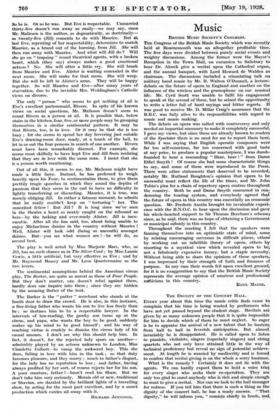Mu s ic BRITISH MUSIC SOCIETY'S CONGRESS.
THE Congress of the British Music Society which was recently. held at Bournemouth was an altogether profitable time. The five days were divided between purely social events and weighty discussions. Among the former were the Mayor's Reception in the Town Hall, an excursion to Salisbury to hear Dr. Alcock give a recital upon the Cathedral organ; and the annual banquet, with Lord Howard de Walden as cliairman The discussions included a stimulating talk on military band music by Mr. B. Walton O'Donnell, a lecture- debate on the future of opera in England and another on the influence of the wireless and the graniophone on our musical life. Mr. Cyril Scott was unable to fulffi his engagement to speak at the second of these, but he seized the opportunity to write a letter full of hard sayings and bitter regrets. It was good to receive Mr. D. Millar Craig's assurance that the B.B.C. was fully alive. to its responsibilities with regard to music and music making.
The debate on opera was salted with controversy and only
needed an impartial summary to make it completely successfuL, I gave my views, but since these are already known to readers of the Spectator there is no need for me to report them here:. While I was saying that English operatic composers were far too self-conscious, far too concerned with good taste at any price, to produce a popular masterpiece, I was dumb- founded to hear a resounding " Hear, hear ! " from Dame- Ethel Smyth ! Of course she had some characteristic things to say, and some of them were reproduced in the Press. There were other statements that deserved to be recorded; notably Mr. Rutland Boughton's opinion that opera to be successful must reflect the life of the times, and Mr. John Tobin's plea for a chain of repertory opera centres throughout' the country. Both he and Dame Smyth concurred in con- demning the touring system, and everybody agreed that the future of opera in this country was essentially an economic- question. Mr. Frederic Austin brought his invaluable expert-, ence with the B.N.O.C. to bear upon the discussion and gave his whole-hearted support to Sir Thomas Beecham's scheme; since, as he said, there was no hope of obtaining a Government or municipal subsidy in this country.
Throughout the meeting I felt that the speakers were
fanning themselves into an optimistic state of mind, some by relating encouraging successes in difficult places, others' by working out an infallible theory of opera, others by resorting to a mystical view which revealed opera to be'i not a fabulously expensive luxury, but a staple necessity, Without being able to share the opinions of these speakers; I was impressed by their strength of faith and firmness of purpose. In any case their words fell upon excellent ground; for it is no exaggeration to say that the British Music Society represents the average opinion- of amateur and professional melliicians in this country.
BASIL MAINE.


































 Previous page
Previous page